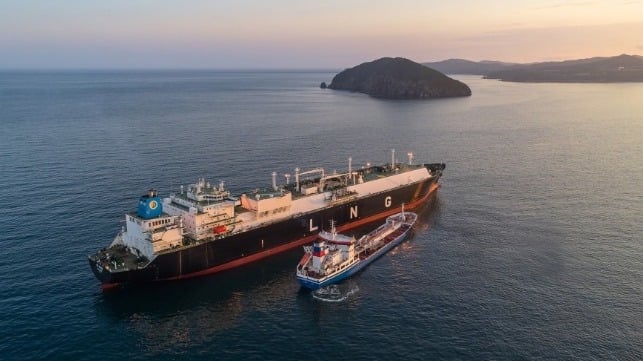SEA-LNG Responds to World Bank Citing Risk of Mistaken Conclusions

Responding to the World Bank report recommending avoiding LNG in the efforts to decarbonize shipping, industry coalition SEA-LNG cautioned against waiting for future fuels that continue to face significant hurdles and not using a proven fuel that is providing advantages today in the efforts to reduce GHG emissions. In a strongly-worded statement, the industry group said it encourages informed debate, but that it believes the World Bank failed to acknowledge advancements and risks stifling innovation while citing dated studies to reach mistaken conclusions.
“To suggest that investments not be made in the LNG sector is unwise,” writes SEA-LNG in its response, saying that the approach, “will prolong the use of higher emissions fuels and slow down shipping’s decarbonization. SEA-LNG believes strongly that the transition to future fuels must not follow this prescriptive approach. It is far too early to decide what the real potential of various alternatives fuels will be for a highly complex, hard-to-abate, global industry.”
SEA-LNG highlights that LNG is an available option for the industry to take immediate steps to develop responses while it recognizes that technologies are also constantly evolving. They point to the 50-plus year proven track record of LNG, the safe operational experience, existing infrastructure in use today, and the incremental pathway for decarbonization through the growth of bio- and synthetic LNG. SEA-LNG published an updated study last week reporting that LNG as a marine fuel provides GHG benefits of up to 23 percent on a Well-to-Wake (WtW) basis and up to 30 percent on a Tank-to-Wake (TtW) basis compared with current oil-based marine fuels.
Saying that theoretical arguments are an important starting position, SEA-LNG however feels that the World Bank’s recent report “attempts to prescribe solutions and predict the timing of future technology development.” Some of the studies that the World Bank cites, SEA-LNG says are based on out-of-date technologies used in niche maritime operations.
The industry coalition address the World Bank’s primary concern of methane slip, acknowledging that it is an issue that needs to be addressed but that its effect must be quantified using up-to-date and accurate information. “Using current engine information, as the SEA-LNG study does, shows that methane slip does not impact LNG’s GHG reduction potential to the extent that the World Bank report claims.”
LNG-fueled vessels being built today SEA-LNG contends have much lower levels of methane slip than what is often cited in academic studies. Peter Keller, Chairman of SEA-LNG recently noted, “often based on outdated data, methane slip has become an overused argument for those wishing to justify inaction.” The organization also highlights efforts to reduce methane slip further with design changes by manufacturers and the implementation of advanced combustion algorithms.

that matters most
Get the latest maritime news delivered to your inbox daily.
The World Bank in its report identifies green ammonia and hydrogen as the only viable future fuels, without addressing the challenges associated with these fuels. SEA-LNG highlights that considerable research and development, as well as extensive operational testing is still needed to overcome the technological, regulatory, and investment hurdles before they become safe and viable in the marine environment.
“The World Bank’s untested theoretical approach risks delaying the shipping industry’s decarbonization and at worst it can lead the industry down a technology cul-de-sac,” says SEA-LNG. They conclude by writing, “SEA-LNG encourages informed debate of future fuels. It is important however, to base this debate on objective, up-to-date Life Cycle Analysis and recognize that we need to start with proven technologies, not future concepts that are currently no more than wishful thinking.”
